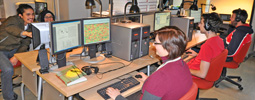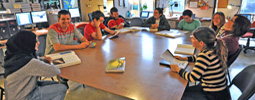Research in the Mennill
Sound Analysis Lab focuses on
the
ecology and evolution of communication, mating systems, and migration
in wild animals. My students and I study the interaction
between animal communication and animal ecology, and
the influence of natural selection and sexual selection on vocal
behaviour, breeding activities, and migratory movements,
including attention to animal
conservation and the impacts of climate change and anthropogenic
disturbance. We focus heavily on the behavioural ecology of birds but
we
also study frogs and whales as well as other mammals. I am a field
biologist; my
students and I combine our laboratory-based research with an intensive
field-based approach to study the behavioural ecology and conservation
of animals in
their natural environment. Together with a variety of
collaborators, I maintain ongoing
studies of temperate birds and whales in Canada, and tropical birds and
toads in Mexico,
Costa Rica, and Colombia.
Field-based and Lab-based
Research
In the field, my students and I use a variety
of innovative techniques to study mating systems, communication
systems, and animal migration. We use interactive playback and
multi-channel
playback to investigate animal communication strategies and the
evolution of animal signals. We use long-term remote recordings as a
passive strategy for monitoring the behaviour and ecology of rare and
endangered birds. We have helped pioneer the development of an Acoustic
Location System (ALS) capable of triangulating the position of
free-living
animals based on the sounds they produce. Presently, we are using ALS
technology to study the ecology of vocal duetting behaviour in tropical
birds in Costa Rica, the evolution of communication networks in
temperate birds in Canada, and studies of migratory birds that pass
between temperate breeding grounds and tropical overwintering grounds.



On campus at the University of Windsor, I run
one of Canada's largest
and most
comprehensive laboratories devoted to the study of animal sounds. My
laboratory includes a digital library of over 250 terrabytes of
recordings of animal sounds from North, Central, and South America. I
have six sound analysis stations running state-of-the-art sound
analysis software that my students and I use to analyze our field
recordings. I collaborate with other professors in the Department of
Biological Sciences to conduct studies of plumage colour and genetic
mating systems.
 Research sites
Research sites
In Canada I study the communication and
mating behaviour of territorial songbirds. Although the ecology of many
North America birds is generally well understood, my research
demonstrates that alternative frameworks may be more suitable for
modeling animal communication behaviour and reproductive choices. In
particular, I have shown that
songbird populations may be thought of as networks of communicating
individuals and that females make reproductive decisions based on
males’ network-based behaviour.
In Santa Rosa National Park, within the Area
de Conservacion Guanacaste, Costa Rica, I study the mating system and
communication system of
resident tropical animals. The ecology of tropical animals is
poorly understood, especially with respect to their vocal behaviour and
mating systems. In 2002, I began research on the
Thryothorus
wrens in the Guanacaste Conservation Area in northwest Costa Rica. To
date, the project has involved colour banding individuals, monitoring
territoriality and reproductive behaviour, and describing the
vocalizations of species that have never been studied previously. My
research has revealed new insight into the similarities and differences
of vocal behaviour in temperate versus tropical birds, and the ecology
and evolution of female song and vocal duetting.
Inclusivity statement
In our lab, I am committed to creating an academic environment that
prioritizes
equity, diversity, and inclusivity. Everyone is welcome in our lab,
regardless of gender, gender-identity, sexuality, ethnicity,
religion, culture, and national origins. I think we are better
scientists when we
recognize and respect diverse perspectives, and when everyone on our
team knows that their involvement is welcome and valuable.
Land acknowledgement
Our university sits on
traditional territory of the Three Fires Confederacy of First Nations,
which includes the Ojibwa, the Odawa, and the Potawatomie. As a
professor, an ecologist, and an ornithologist, I respect and
acknowledge the long relationship between First Nations people and this
place, including the birds, the animals, and the ecosystems in this
place.